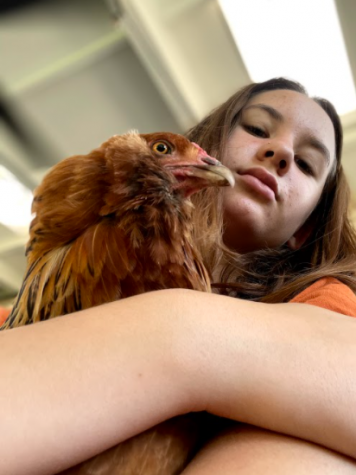Combating Celebrity Brands: The Responsibility is Ours
February 22, 2023
At just 18 years old, Kylie Jenner released her $29 Lip Kits in November 2015, complete with a liquid lipstick and lip liner. Immediately, her entire stock sold out. What nobody could predict, though, was that within just five years her makeup brand, Kylie Cosmetics, would propel her to becoming the first self-made billionaire.
While celebrity brands have existed for years, the introduction of Kylie Cosmetics and its highly publicized success spiraled into other celebrities releasing their brands at a dizzying rate. In 2022, 19 new brands were created by A-listers, or the most famous celebrities, excluding trademarks. There’s Scarlett Johansson’s skincare line The Outset, Gwen Stefani’s makeup brand GXVE, and Hailey Bieber’s brand Rhode, to name just three of many. Announcements of new releases are so frequent and predictable they have begun to feel like satire — what is another skincare brand going to contribute to the industry besides environmental consequences, including excess plastic and packaging materials? Additionally, consumers are often left questioning the quality of the product and the intent when A-listers like Millie Bobby Brown release beauty brands at the age of 15.
Thriving in a new generation, celebrities starting a company do not have to allocate large amounts of money to marketing. Instead, they have a more useful tool that caters to a broader audience: social media. Kylie Jenner has over 379 million followers on Instagram and is considered one of the pioneers of social media marketing, based on her success promoting her makeup company, Kylie Cosmetics. Social media provides followers with the illusion of knowing the influencer, creating a personal relationship between the star and the follower. Consequently, when the influencer releases a product, the follower has a greater incentive to purchase it. These social media relationships are credited with boosting influencer brands to their success today, making us, as followers, part of the reason behind the influx of new celebrity brands.
Beyond relationships between followers and celebrities, celebrities use paid promotions with other influencers, hoping this will result in a broader audience purchasing the product. Selena Gomez’s Rare Beauty, for example, can credit much of its success to beauty influencers and Gen Z alike gushing over the quality, colors, and packaging of their liquid blushes. Despite everything, social media marketing through gaining follower trust is genius, as it humanizes an ambition that’s clearly money-driven. After all, why do consumers desire products that, without a celebrity’s influence, are ultimately worthless? What percentage of consumers are actually interested in the product, and not owning a piece of their favorite celebrity?
However, the beauty industry is just the beginning of A-lister ambitions. Some have ventured to other profitable pursuits they have no authority over. Following a 3.5-year mission to “make the best tasting tequila” in February 2021, Kendall Jenner announced her latest business endeavor, her tequila brand 818. The repercussions of this brand were vast. 818 was released during an agave shortage that put smaller producers out of business and only worsened the situation by adding an extra demand for tequila. Additionally, Jenner brutally appropriated Mexican culture without care. Tequila and agave are embedded in Mexican culture, and traditions like these should not be exploited for profits, especially by an American woman. Jenner also made a critical Spanish grammar error, writing “blanco tequila” on her labels instead of the correct version, “tequila blanco”. This clearly displays Jenner’s lack of care for her products, especially the culture they come from and their impact.
Examples like these raise the question, is it ethical for celebrities to be doing this? In truth, stars who have the budget to create a beauty brand have already reaped the benefits of their work. There is zero necessity to continue releasing brands when stars are not in need of yet another quick buck. Instead of trying to attain even more wealth, they should be doing something meaningful with the plentiful money they already have. The reality of these ventures is buyers who purchase A-lister products are more interested in the celebrity than the actual product, meaning that in most cases there is no need for them to exist. Despite that, with the proper intent, a celebrity brand can contribute something meaningful to the industry.
To say Rihanna’s Fenty Beauty forever changed the makeup industry is no exaggeration. The beauty industry pre-Fenty was problematic at best, blatantly lacking diversity and representation, and promoting unrealistic standards. At the time of its release, the 40 (now 50) shades offered in their foundation were revolutionary, including shades for everyone. Their marketing and campaign offered equal diversity, and for the first time in the beauty industry, a makeup brand accommodated a wider variety of skin tones. Although Rihanna was one of the many founders of this brand, Fenty is proof that celebrities can contribute something valuable to the industry as long as they have the right intention.
Looking ahead, the future of celebrity brands is in question. Will the sales dwindle, if not plummet, if the hype surrounding the celebrity falls? Or alternatively, will celebrity brands take over and replace existing current brands? Recent statistics do prove that a decline in public image will result in a massive decrease in popularity and demand, as seen in Kylie Cosmetics’ crash after the hype surrounding Kylie Jenner diminished. Fluctuations in the public image are just another problem celebrities with brands face.
But the problematic tendencies of these brands do not end there. They feed media idolizations that consumers develop and present the idea that in buying a celebrity product, celebrity beauty is attainable. However, the celebrity “beauty” we see can be attributed to photoshop or cosmetic alterations. In buying Kylie Cosmetics, the consumer will not look like Kylie Jenner. With the onset of body-positive movements, a decline in celebrity brand interest may occur, as it is being recognized that the stars that we often idolize represent a false ideal.
It is difficult to resist the urge to buy into celebrity brands with overwhelming hype and media pressure. From 818 to Florence by Mills, before picking up a product with a famous face on it, question the intent and origins of the product, and look at where your money is going. Consider looking into more environmentally friendly, ethical, or sustainable alternatives before feeding the pockets of an A-lister. And now while futility settles like dust in the warehouses stocking unnecessary celebrity products, hopefully, we will begin to see an end to this movement and return to more socially aware purchases.



